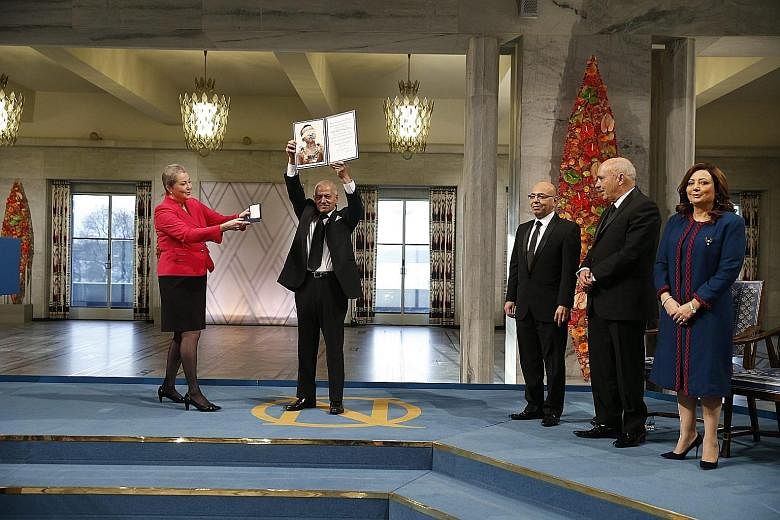OSLO • The Nobel Peace Prize was yesterday presented to a group of four organisations that saved Tunisia's transition to democracy through dialogue, a method the laureates are keen to see applied in Syria and Libya.
"This year's prize is truly a prize for peace, awarded against a backdrop of unrest and war," the head of the Norwegian Nobel Committee, Ms Kaci Kullmann Five, said at the formal award ceremony in Oslo, held in the presence of Norway's King Harald and under tight security following recent terror attacks around the world.
"We live in turbulent times. In North Africa, the Middle East and Europe, millions of people are fleeing from war, oppression, suffering and terror," she said. "If every country had done as Tunisia has done, and paved the way for dialogue, tolerance, democracy and equal rights, far fewer people would have been forced to flee."
The National Dialogue Quartet, made up of four civil society groups, helped save Tunisia's transition to democracy at a sensitive moment in 2013, when the process was in danger of collapsing because of widespread social unrest.
The group orchestrated a lengthy and thorny "national dialogue" between the Islamists of the Ennahda party and their opponents.
"Its work has led to a better platform for peace and non-violent resolution of conflicts.
"This is a story about building strong institutions to ensure justice and stability, and demonstrating the will to engage in dialogue and cooperation," Ms Kullmann Five said.
The Quartet consists of the Human Rights League, the General Labour Union, the Confederation of Industry, Trade and Handicrafts and the Order of Lawyers.
The laureates have said they are keen to see the method applied in Syria and Libya.
"Arms can never be a solution, not in Syria nor in Libya. There is a need for dialogue," Mr Abdessatar Ben Moussa, head of Tunisia's Human Rights League, told reporters in Oslo on Wednesday.
In honouring the Quartet, the Nobel Committee shone the spotlight on Tunisia as a rare success story to emerge from the Arab Spring, the movement of popular uprisings that started in the country.
In neighbouring Sweden, the Nobel Prize winners in literature, chemistry, physics, medicine and economics gathered yesterday in Stockholm to receive their prizes from the King of Sweden.
The Nobel Prize consists of a gold medal, a diploma and the sum of eight million Swedish kronor (S$1.3 million).
AGENCE FRANCE-PRESSE, REUTERS

